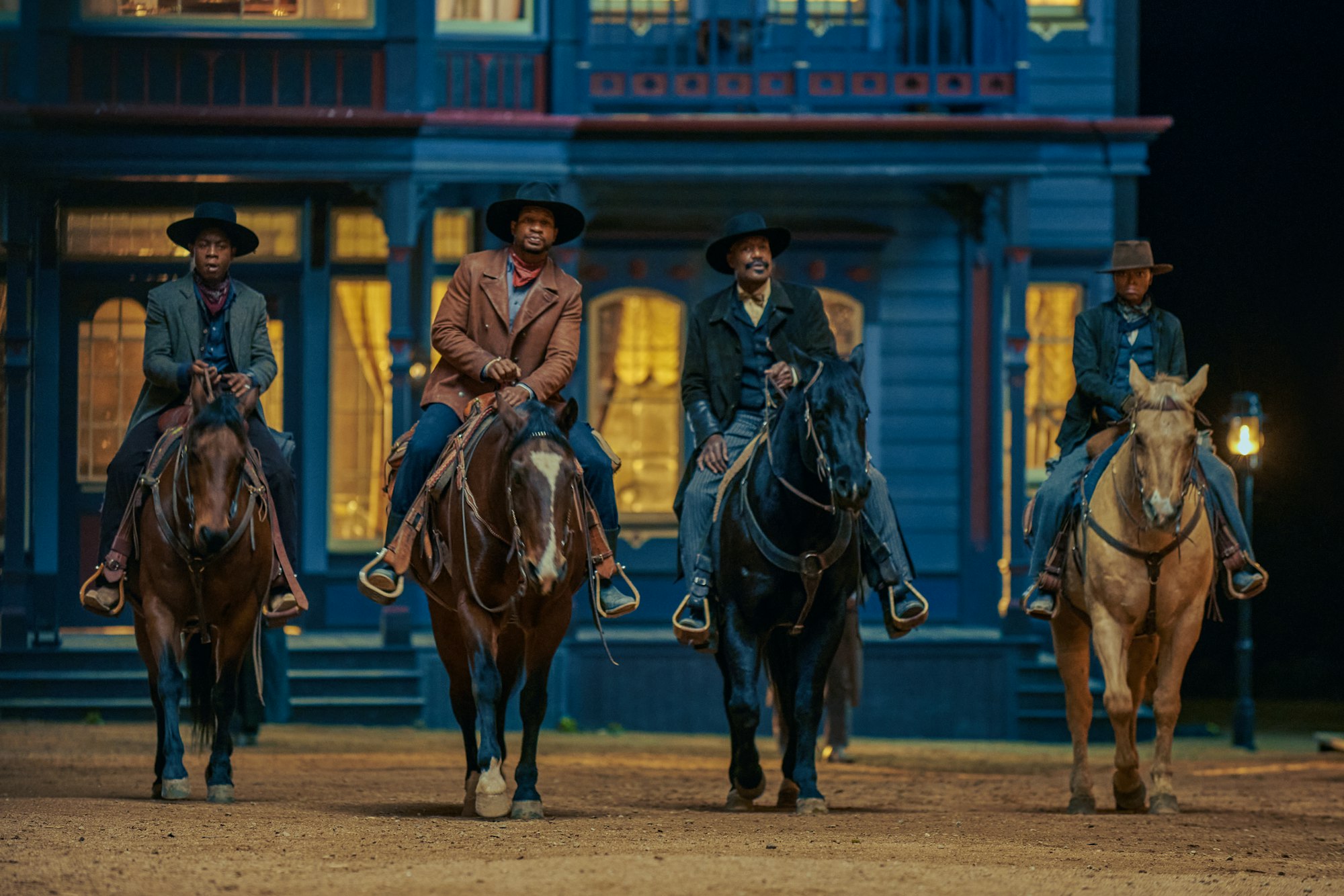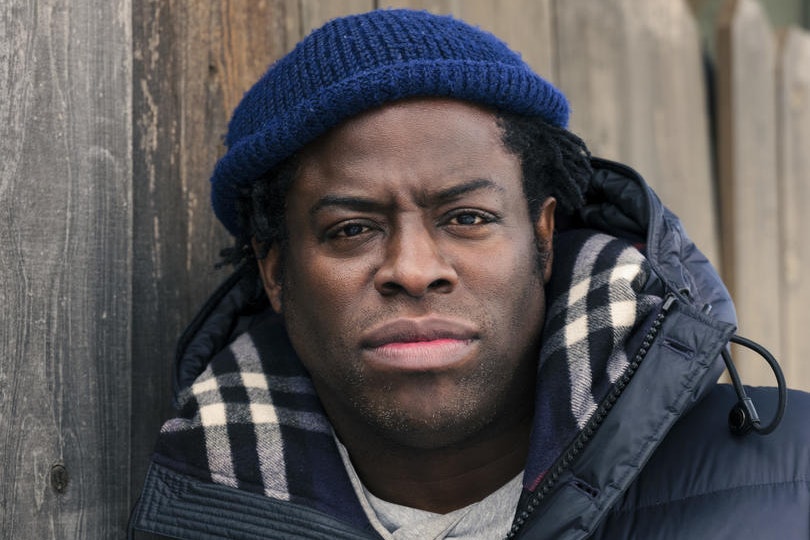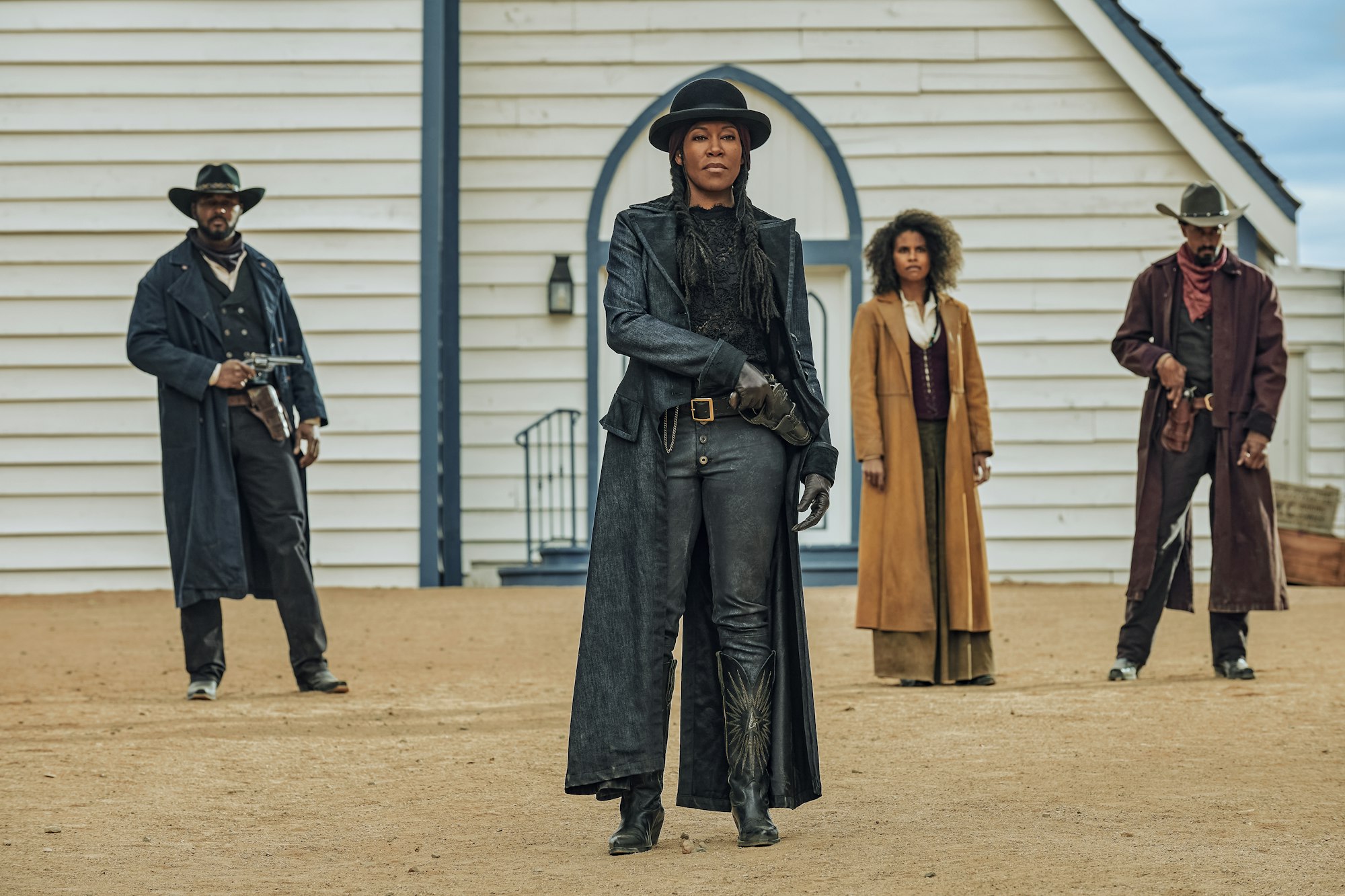COMPOSER OF THE YEAR 2021
Words by Amon Warmann
What would you do if you were able to make a film in your favourite genre? For Jeymes Samuel, the answer is…everything. With The Harder They Fall, he breathes new life into the Old West, from a cast full of Black A-listers - all of whom are playing real-life outlaws - to the dynamic score and soundtrack, which he put together himself.
That latter detail shouldn’t be all that surprising. Long before he became a filmmaker, Samuel was a musician who went by the stage name The Bullitts. His songwriting background and love of reggae are all over his debut film, which also includes a title track from Jay-Z (who also has a producer credit on the film). It’s not what you’d immediately think of when it comes to music in Westerns, but it absolutely works.

Samuel is particularly clever when it comes to The Harder They Fall’s original songs. This Western is more about Black joy than it is Black struggle, and while race and America’s dark history when it comes to slavery are never made explicit, Samuel tells elements of those stories in song. It’s a smart approach that frequently pays dividends.
When we catch up with Samuel, his enthusiasm and passion for his work shine through. Throughout our chat, he regularly breaks out into song as he explains what went into his unique score, working with Kid Cudi and Jay-Z, why reggae is a perfect fit for Westerns, and much more.

What do you love about music in Westerns? Is there any particular score that sticks out to you?
I've actually never said this before, but Westerns are my favourite movies for scores. You can categorise your era of Western by the scores. As you go through time – from John Huston’s films to Sergio Leone – not only do the films change, but the music changes. Sergio Leone and Ennio Morricone would give us the electric guitar (which was a new instrument at the time) and a vocal. Morricone killed it with the Westerns. ‘Ecstasy of Gold’ from The Good, The Bad, and The Ugly is one of the greatest pieces of music ever written. Then you take Elmer Bernstein’s score for The Magnificent Seven, and that’s amazing. That’s arguably my favourite film theme of all time.
And look at how different those movies are, aesthetically. They’re not even speaking English in the Sergio Leone Westerns. They’re speaking Italian, and they dubbed the English after. So for me, the scores for Westerns have informed every single genre of cinema that we have.
How much are you thinking about the musical side of things as you’re directing?
For me, it goes hand in hand. I also wrote and produced the entire soundtrack with all those various artists, so I do everything all at once. For me, music and script are one and the same. It's almost like I see music and I hear cinema. So when I'm writing a script, I'm hearing melodies. I'm hearing the score, as I'm writing. And so I started writing the score. As I'm writing the script, then I'll write songs. They all speak to each other.
I'll be writing the script, and then the first thing you see Bill Pickett do is sing. When he comes on screen, you don't hear words. He says “Upon my return / See a changed soul / That road was far / And way too long.” The first time you see Stagecoach Mary, she sings a song I wrote called the Jim Crow count: “Get that horse and his wagon / Get that man and his rifle.” She goes in, right? And I believe that it’s all the same thing. When a song finishes, we should be in a different place story-wise than when the song began, in the same way, that dialogue serves a movie. And I do them both simultaneously.
I really wanted to celebrate the score with this movie, but also celebrate the soundtrack.
There’s a really nice balance between the characters’ having their own musical identity which they actually voice themselves, and the score itself doing the heavy lifting. How did you determine when to use which?
I always just listen to the story. The story will guide you. For instance, when Nat Love is riding into Douglastown, you hear an original Barrington Levy song [‘Better than Gold’]. It goes “Where are the children of men? / Questions that we did not know / When will we see them again? Questions that we did not know.” The song is speaking to how we got taken from Africa and brought to the West Indies and North America. It goes “For queens and kings and shining things / They gave our souls / But they soon learned that freedom’s better than gold.”
But as Nat Love gets off his horse and walks into the saloon, the song morphs. It’s the same song, but now it’s the saloon version. So they literally go hand in hand. Sometimes it's a place for score and other times it’s a place for song, but because I’m doing everything, it just feels seamless
How important was it to have an opening credits sequence in this movie?
It was so important. I really wanted to celebrate the score with this movie, but also celebrate the soundtrack. Too often I listen to soundtracks that have nothing to do with the movie. I wanted to celebrate the score and the soundtrack and show how they are woven in seamlessly. And I miss a great song opening a film. Like, we have to wait for Bond movies to get that now, but that wasn't the case back in the day. So for me with The Harder They Fall, I really needed to give them that banger. The song is called ‘My Guns Go Bang’. Jay-Z is rapping over actual gunshots that make the beat. And then I have Kid Cudi singing “Avalon be damned / Venture foreign lands / I laid my sword in the sand / I’ve made my peace with man / They lay a violent feast / As far as my eyes can see / I seek a golden fleece / One day you’ll make your peace.” It’s about Nat Love. He thinks he’s just killed the last man in this gang he’s been hunting for ages. He thinks it’s over.
I wanted to bring Kid Cudi and Jay-Z together and have them do the song. It’s not an R&B record. To me, it’s totally befitting of the time and era. Back in the day, you’d have opening titles from Bernard Hermann. You couldn’t wait to watch the film after that opening sequence. I don’t get that as much now, so I really wanted to bring that back.
Did you give a brief to Jay-Z and Kid Cudi or do you just let them rip?
Well, Jay is a producer so he knows the film inside and out. And Kid Cudi would get inside my brain and figure out exactly what the mission is. Everyone understands the assignment. It's a really beautiful thing, especially watching Kid Cudi work. When working creatively with Jay-Z, there's no area you go that he doesn't already speak fluently. He hasn't already assumed you're going there, and he hasn't already got the answers. Me and him are always in lockstep when it comes to music and creative decisions. He brought me on to The Great Gatsby, so he understands all of that stuff.
What is it about reggae that you feel works so well in a Western?
Reggae – and dub in particular, which is a subgenre of reggae – is heavily influenced by cowboy music. They've named themselves after cowboys. You think about artists like The Outlaw Josey Wales. Eek-a-Mouse, who calls himself the Black cowboy. A singer called Pinchers, whose biggest record was ‘Bandeleros’. It's almost like they'll take an Ennio Morricone riff and put a thumping bass under it, and if anyone stopped and thought about it for a bit they’d realise that it’s cowboy music. So for me when I was a kid, I used to hear Barrington Levy and his signature melodic tongue roll – “Shoodilley-waddliley-diddley-diddley woh-oh-oh / Zeen, here I come” – and I’d see horses galloping. I told myself when I grow up, I’m going to make a cowboy film and have Barrington Levy on the soundtrack. And then I grew up and I rebuilt the song and got Levy to sing on the actual score.
So for me, they’ve always been influenced by cowboy music, but most notably Ennio Morricone. This American reggae legend called Eek-a-Mouse… when you break down the way he sings, he's actually mimicking Morricone’s guitar. If you take a world, make a great movie, make all these original themes and jams, and then put an orchestra on top of it, it’s just amazing for me.
How often would you play reggae music on set while playing back scenes?
All the time! Here's the thing – I haven’t been fed what I've wanted from a Western in years. The film we make is for the public. The making of the film is for us. So I would play music again and again and again, non-stop, and I played music to whatever scene I was filming that day. So when Idris, Regina, and LaKeith entered Redwood City, I played Dennis Brown’s ‘A Promised Land’ over the tannoys. I had the whole set wired for speakers. I did that in practically all of my scenes. I have to have music there.
Saloons are a big part of the Western. We get two here - one belonging to Stagecoach Mary (Zazie Beetz), who sings her own song, the other belonging to Trudy - and on a musical level, both are very distinctive.
One of my favourite Westerns of all time, probably because I love Doris Day so much, is Calamity Jane. It's a musical, so she's singing for no reason every four minutes. But when she does ‘Windy City’ in that saloon, it is wicked! As I'm singing that song, my hands start making my own beats to it. That's what happens in my brain when I’m watching a musical.
So for me, Stagecoach Mary’s introductory sequence was me paying homage to Calamity Jane. When I get to Trudy’s saloon, it’s a whole other experience. You meet a blue lady. She's dancing to Alice Smith singing in the background. And Alice Smith is singing a song called ‘Wednesday's Child’.
The song ‘Wednesday's Child’ speaks about slavery, the arrival of the ships, and what happened in the Middle Passage [The Middle Passage was the stage of the Atlantic slave trade in which millions of enslaved Africans were forcibly transported to the Americas as part of the triangular slave trade]. The blue lady, who is played by Akilah Cornelius… her blue signifies the sea, and her dance, which is mesmerizing, signifies hope. As dire a position these people have been placed in, they still move on. The blue is the sea, the movement is the people and the words of ‘Wednesday's Child’ in the background are the story of what we went through.
But our placement of those two scenes and those two environments in the saloon is by design. One is like rebellion, and the other represents hope. So it was important for me to give those saloons entirely different feelings and stories to both of them. Every single scene has to be its own story, so to speak.

In certain scenes, the score or the soundtrack will be humming away very quietly in the background, and then you up the volume as the scene crescendos. It’s really effective.
I like the subliminal hypnosis of melody. So it's still there underneath, and you're getting familiar with it even if you can’t hear it as well as you might usually hear it. But by the time it's built, you're familiar with it. I like being fed a characters’ theme or motif. But I also don’t mind when it’s being rammed down my throat. When you hear Darth Vader’s theme, you know that someone’s getting murked. You know what’s going down at that particular moment.
So I like it when you’re force-feeding a theme, but I also like when it’s introduced really subtly. I believe that the camera talks to us all the time, and it tells us a story. But while the cameras are telling you the story, then the score is clothing you and putting a blanket around you and giving you the cup of hot chocolate and telling you it's gonna be alright. Or not. I love that. I love watching the movie as you just did and recognising the theme towards the end that they fed me at the beginning of the movie. I love it so much. And sometimes I get frustrated because I don't get fed enough melodic scores.
When working creatively with Jay-Z, there's no area you go that he doesn't already speak fluently.
You’re not the only artist scoring for TV and film. Labrinth did the music for Euphoria and Malcolm & Marie, and Devonte Hynes (aka Blood Orange) scored Queen & Slim. Do you see other artists following this path?
Absolutely. I really like Labrinth. To me, he is actually a filmmaker. He’s giving you film music without the visuals. There are many more people coming up that are kind of already scoring but I believe they're also going to get into directing. All of these new youthful voices coming into the game now make for a more exciting evolution in film music. The only key to evolution is inclusion, and you have to pull in everyone that hasn't composed before and just give them a chance.
The Harder They Fall is now on Netflix.
